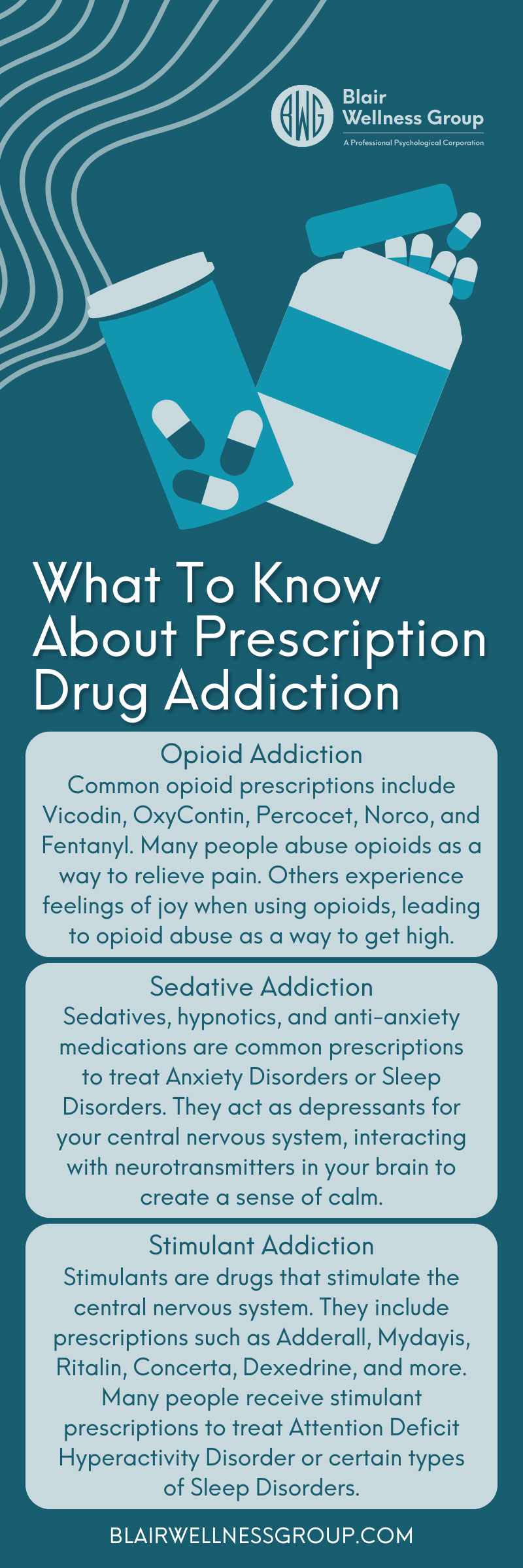Prescription Drug Addiction is not always easy to identify. Unlike Substance Abuse Disorders that revolve around illicit substances, Prescription Drug Addictions involve the misuse of legal drugs and can even start with a valid prescription. This does not make Prescription Drug Abuse any less dangerous, though.
It is important to understand the types of Prescription Drug Addictions, their symptoms, and the risk factors that lead to them. Individuals who know how prescription drugs affect the brain and body have a better chance of understanding the development of dependence and identifying the signs of addiction. Discover all you need to know about Prescription Drug Addiction and see why professional intervention from a Licensed Clinical Psychologist is essential with this overview.
Defining Prescription Drug Abuse
Abusing prescription drugs involves misusing a prescription medicine in any way. This can involve anything from using an improper dosage of your own prescription medicine to stealing prescription drugs with the intent of getting high. Some people abuse prescription drugs as a misguided attempt to treat legitimate health concerns.
For example, you might take a painkiller from a friend’s leftover prescription to deal with your own pain. Though your intentions are not inherently bad, this is still a misguided attempt to find treatment—and the consequences can be severe for both your physical and Mental Health. Over time, you can build up a dependence to the drug, turning your prescription drug abuse into an Addiction Disorder that is hard to escape.
Most Common Prescription Drug Addictions
One of the most important things to know about Prescription Drug Addiction is that it can happen with any prescription medication. However, prescription drug abuse most commonly occurs with drugs such as opioids, sedatives, and stimulants because of the way these drugs interact with the brain and central nervous system.
Opioid Addiction
Opioids are painkillers. They contain components such as oxycodone or hydrocodone, which interact with opioid receptors in the brain to relieve pain. Common opioid prescriptions include Vicodin, OxyContin, Percocet, Norco, and Fentanyl. Many people abuse opioids as a way to relieve pain. Others experience feelings of joy when using opioids, leading to opioid abuse as a way to get high.
Opioids come with a wide range of side effects, including constipation, nausea, slowed breathing, drowsiness, confusion, and poor coordination. Over time, an increase in tolerance leads to individuals needing a higher opioid dosage to relieve pain, which increases your risk of damaging side effects. These side effects can lead to harmful and sometimes deadly symptoms when you abuse opioids. In some cases, opioid abuse can even lead to severe breathing problems, coma, and death.
Sedative Addiction
Sedatives, hypnotics, and anti-anxiety medications are common prescriptions to treat Anxiety Disorders or Sleep Disorders. They act as depressants for your central nervous system, interacting with neurotransmitters in your brain to create a sense of calm. This calm helps to ease stress and worry and improve sleep. These types of drugs include prescriptions such as Xanax, Ambien, Valium, and more.
Abusing sedatives can lead to drowsiness, confusion, dizziness, poor coordination, slurred speech, poor concentration, and memory issues. Sedatives can also slow your heartbeat and breathing. In extreme cases, abusing sedatives can cause seizures.
Stimulant Addiction
Stimulants are drugs that stimulate the central nervous system. They include prescriptions such as Adderall, Vyvanse, Mydayis, Ritalin, Concerta, Dexedrine, and more. Many people receive stimulant prescriptions to treat Attention Deficit Hyperactivity Disorder or certain types of Sleep Disorders. Sometimes patients may try to self-medicate by abusing prescription medications, which can cause them to become dependent and start abusing them to band-aid the root cause of their Mental Health Disorders.
Abusing stimulants can cause a similar high to certain illicit drugs like cocaine or methamphetamine. Stimulants can also increase your alertness, which means they can also lead to hyper-vigilance, paranoia, anxiety, agitation, and insomnia. Other symptoms of stimulant abuse include heart problems like an irregular heartbeat and high blood pressure, an increase in body temperature, reduced appetite, an increase in aggression, hallucinations, tremors, and seizures.
Other Symptoms and Behaviors of Prescription Drug Addiction
Prescription Drug Addiction can also lead to behavioral changes that harm your quality of life. These changes can disrupt your career, put strain on relationships, and lead to harmful consequences for your physical health.
Many of these symptoms stem from an increased desire to partake in the drug you are addicted to. Some people turn to illegal behaviors such as forging documentation or committing identity fraud to obtain prescription medicines. Others steal prescription drugs from pharmacies or from people they know.
Other behavioral changes come from mood or energy swings resulting from prescription drug abuse. These dramatic cycles of extreme highs and lows can lead to hostility, sleep disruptions, poor decision-making, and periods of high energy or extreme fatigue.
Reward, Dependence, and Addiction
Prescription drugs are common objects of Substance Abuse Disorders because of the way they interact with the neurotransmitters in your brain. These medicines either increase or decrease the effects of specific neurotransmitters, influencing the central nervous system and affecting the entire body. This makes them powerful solutions for easing pain or soothing anxiety, but it also creates a risk of permanently affecting your brain function.
Over time, prescription drugs can alter your brain chemistry and lead to drug tolerance. This means you will need a higher dosage to affect your central nervous system and achieve your desired results. The more you use a prescription drug, the higher tolerance you develop over time. This also means you will develop dependency on the drug, causing you to feel as if you need more of the drug in order to make it through the day.
Risk Factors for Prescription Drug Addiction
Many of the risk factors for Prescription Drug Addiction coincide with risk factors for other Addiction Disorders. These factors include genetic predisposition or a family history of Substance Abuse Disorders, comorbid Mental Health Disorders such as Anxiety Disorders or Depressive Disorders, peer pressure, or easy access to addictive substances. Other pre-existing Addiction Disorders like Alcohol Addiction or other Substance Abuse Disorders can also increase your chances of developing a Prescription Drug Disorder.
Treating Prescription Drug Addiction
As tolerance and dependence increase, it becomes harder to overcome Addiction. That is why it is essential to seek treatment from a Licensed Clinical Psychologist who provides Prescription Drug Addiction treatment. Through evidence-based therapies revolving around behavioral treatment, you can heal from your addiction and regain control over your life.
If you are looking for Addiction Treatment from a Licensed Clinical Psychologist in Irvine, Beverly Hills, Newport Beach, Bel Air, Century City, Brentwood, Westwood, Huntington Beach, Mission Viejo, Aliso Viejo, and the surrounding areas, contact Blair Wellness Group to see how our evidence-based treatment plans can help you.
















